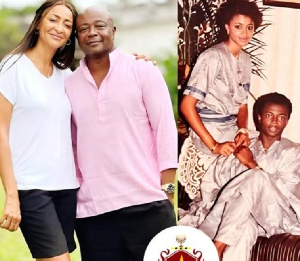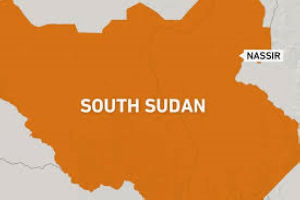What is it you intend to do that you have not had the opportunity to do
The eight top Ministers of President Kufuor’s government who recently resigned from their various portfolios to contest for the presidential candidature of the ruling New Patriotic Party (NPP) and other former Ministers in the race may have to pull the brakes on their campaign machines to reflect on how to find an answer to a grueling question posed by one of the contenders in the race, Mr. Boakye Agyarko: ‘What is it you intend to do that you have not had the opportunity to do?’
For the international banker and former Vice President of the Bank of New York, after fifty years of independence, Ghana should not have been in the state it is now. He strongly believes that the nation could have done better and still holds the conviction that with good leadership, the nation can and must get better than it is now.
“We cannot deny or run away from the disillusionment, disappointment and frustration of our loyalists and foot soldiers in the NPP. We cannot deny the deep sense of unfulfilled expectation of the nation at large. In the end, there is a foreboding sense that we have not delivered to our level of expectation or potential as a party with talents, hence a credibility problem going into 2008,” Agyarko told The Chronicle.
Having laid a sound premise, and espoused his conviction that the nation could have done better, Agyarko, also known as the NPP’s King David, then followed up with the question that may get Minister aspirants in particular and those who have been describing themselves as, ‘insiders’ because of their continued stay in Ghana over the years, temporary halting their campaigning to take a deep pause for reflections:
“So of my fellow contestants, I ask, what is it that you intend to do going forward, that you already have not had the opportunity to do after almost eight years in office?”
After posing the question and pointing out the disillusionment of party followers and disappointment of the nation at large, he challenged his co-competitors, particularly those who had the opportunity to serve in the current government, to let their records of service speak for them rather than telling delegates what they will be able to do.
Mr. Agyarko emphasized that the issue of credibility was going to be a crucial factor in the 2008 elections and reminded party delegates that for the NPP to retain power, it needs a credible candidate who cannot be accused of any failure in any sector of the nation over the past two decades and thus someone who would remain credible in the eyes of the electorate, stressing that “every credible message needs a credible messenger,” and adding, “I am unshakable in my belief that I can live up to the billing.”
“So in effect, we are going to have to conduct a legitimate examination of each incumbent’s record of achievements and performance in the offices they have held in order to determine and justify whether they have passed the test to which they were subjected and whether based on what we find, we may feel justified in crediting them with the advantages of incumbency or charging them with the disadvantages of incumbency; having stayed around for too long without any perceptible evidence of having served the public purpose…,” he said.
Talking specifically about the race for the presidential slot of the party and ultimately the presidency, the International banker analyzed that there were two broad types of people who seek public office and branded them as ‘those who want to be’ and ‘those who want to do.’
He explained that for those who want to be, they simply want to enjoy the thrills and trappings of power of the office they are seeking and simply think in terms of hierarchy. “They talk in terms of ‘it is my turn, or ‘it is not the turn of this or other opponents.’ Apart from themselves, it is not the turn of any one else.”
“Then there are those who want to do. They seek public office as a platform; the means by which and through which the public good may be achieved. Such office seekers talk about the programmes they seek to implement for the public good. Their 0focus is on policy, debate and discussion- let the best man win and not who is in an imaginary line of sucession,” he expatiated and identified himself with this type of leadership and not the former.
Capabilities
On his competencies and capabilities, Mr. Agyarko observed that his association with the global financial market had equipped him with the relevant negotiation skills, a sense of propriety and managerial skills which are fundamental pre-requisites for effective modern leadership.
He told The Chronicle that he had dealt with several States and helped in policy formulation in major economies in the world through his position as Vice President of the Bank of New York- a major Global Bank, which is the oldest in America. Besides, he said he had learnt how to take critical decisions that sometimes require compromise and consensus building and these were just a few of the leadership qualities he hoped to bring to bear on Ghana’s development drive if given the opportunity to lead the nation.
Asked whether he subscribed to the assertion that presidential candidates ought to be people with parliamentary experience, he responded that if that requirement were so relevant and tied to once ability to deliver as a president, the framers of the nation’s constitution would have made parliamentary experience, a requirement for seeking the presidency.
Mr. Agyarko was further asked whether he would be continuing from where President Kufuor would be leaving off, if giving the mandate to rule the nation, and his response was that, a leader is chosen to execute a particular mandate at any point in time, to fulfill a material need.
Mr. Agyarko opined that at the time President Kufuor was elected, the nation was yearning for a change from the brash and abrasive type of governance to one of a calm demeanour, and noted that this was a mandate the current President has been able to accomplish.
He further noted that the President had also done very well to stabilize the economy and put it on a sound footing. This not withstanding, the aspirant said there were still many development constraints that need to be tackled in other to build upon the successes chalked by the current president.
“In this regard, I believe that my mandate, out of our present and future national needs, if elected president, would mean a clever and skillful shift from stabilization to sustainable growth. I believe I will have a different mandate than president Kufuor and will act in accordance with the imperatives of the mandate that I will be given,” Mr. Agyarko pointed out.
Politics of Saturday, 4 August 2007
Source: Chronicle













